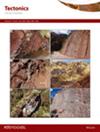Tectono-Stratigraphic Insights on the Dynamics of a Complex Subduction Zone, Northern Peruvian Forearc
IF 3.6
1区 地球科学
Q1 GEOCHEMISTRY & GEOPHYSICS
引用次数: 0
Abstract
Two main types of subduction are recognized around the world: accretionary and erosive. The northern Peruvian margin is a well-known example of a margin subjected to subduction erosion, but to date the along-margin variability and temporal changes in subduction process and forearc basin evolution have not been characterized in detail. Interpretation of regional seismic lines and integration of oil-industry wells and seafloor data captures the erosive nature of subduction underneath the forearc with only a minor accretionary component to the north. Episodes of uplift driven by plate coupling were followed by normal faulting/extensional collapse due to plate decoupling. This mechanism explains the dominance of normal faulting across the forearc until the Oligocene with a slight reactivation within the Miocene. The subduction history is complex and includes a reduction in plate convergence rate related to forearc crustal shortening, represented by large-scale structures including the Peru fault (reactivated) and the Illescas fault-propagation anticlines of the Northwest Peru transpressional system. This crustal deformation started in the Miocene. Integration with magnetic anomaly data indicates that activity of the present-day transpressional system driven by tectonic escape of the Nazca Sliver toward the northeast, may explain the seismicity gap in southern Ecuador and northern Peru. An evolutionary model of the northern Peruvian margin shows how subduction zone geodynamics left its erosive fingerprint in the forearc basin configuration.构造地层学对秘鲁前弧北复杂俯冲带动力学的启示
全世界公认的俯冲有两种主要类型:增生型和侵蚀型。秘鲁北部边缘是遭受俯冲侵蚀的边缘的一个著名例子,但迄今为止,尚未详细了解边缘沿线的变化以及俯冲过程和弧前海盆演化的时间变化。对区域地震测线的解释以及对石油工业油井和海底数据的整合,捕捉到了前弧下方俯冲侵蚀的性质,北部只有少量的增生成分。在板块耦合驱动的隆起事件之后,是板块脱钩导致的正断层/伸展塌陷。这一机制解释了整个前弧的正断层在渐新世之前一直占主导地位,而在中新世则略有恢复。俯冲历史十分复杂,其中包括与前弧地壳缩短有关的板块辐合率下降,这表现为大规模的构造,包括秘鲁断层(重新激活)和秘鲁西北转压系统的伊利斯卡斯断层-辐合反褶。这种地壳变形始于中新世。与磁异常数据的整合表明,纳斯卡斜坡向东北方向的构造逃逸所驱动的现今转压系统的活动可以解释厄瓜多尔南部和秘鲁北部的地震缺口。秘鲁北部边缘的演化模型显示了俯冲带地球动力学如何在弧前盆地构造中留下侵蚀痕迹。
本文章由计算机程序翻译,如有差异,请以英文原文为准。
求助全文
约1分钟内获得全文
求助全文
来源期刊

Tectonics
地学-地球化学与地球物理
CiteScore
7.70
自引率
9.50%
发文量
151
审稿时长
3 months
期刊介绍:
Tectonics (TECT) presents original scientific contributions that describe and explain the evolution, structure, and deformation of Earth¹s lithosphere. Contributions are welcome from any relevant area of research, including field, laboratory, petrological, geochemical, geochronological, geophysical, remote-sensing, and modeling studies. Multidisciplinary studies are particularly encouraged. Tectonics welcomes studies across the range of geologic time.
 求助内容:
求助内容: 应助结果提醒方式:
应助结果提醒方式:


